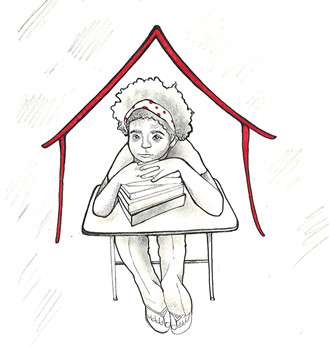Balancing the budget comes at a price
Teachers, union reps concerned by Province’s education reforms

Illustration by Gabrielle Funk
The plan for education reform was unveiled in the provincial government’s throne speech on Oct. 7, contending that parents will have “more say” in the new model. Lieutenant Governor Janice Filmon also announced that the Province would be going through with last year’s proposed phasing out of the education property tax over the course of 10 years.
“Given the challenges we face, however, Manitobans need more tax relief sooner,” Filmon said at the throne speech, adding that the phased elimination will begin next year.
However, some, including the Canadian Union of Public Employees Manitoba (CUPE Manitoba), have expressed concerns over education reform drafted before the pandemic being implemented now, calling it “archaic.”
“The looming threat of education reform has already impacted morale among frontline workers and educators in our school system at a time when the focus should be entirely on supporting our kids,” CUPE Manitoba president Abe Araya said in a news release.
James Bedford, the president of the Manitoba Teachers’ Society (MTS), says he doesn’t believe now, during the COVID-19 pandemic, is the right time to implement these changes.
“Teachers right now are under a lot of stress, just in their everyday classrooms,” he says. “It’s pretty stressful to have an announcement come and say ‘we’re going to proceed with a transformative reform for public education on top of everything you’re doing right now.’”
In Bedford’s eyes, phasing out the education property tax comes with a different kind of price tag. Bedford says having a sustained and guaranteed form of education funding ensures that local school boards can meet their specific needs. Araya also attested to this.
“Local taxation gives school boards the ability to respond to the needs of local communities,” he says. “Without the ability to tax, what’s the future of school boards? If a province controls all the money, what does this mean for school trustees making specific changes to a small rural school to meet the needs of its community? We don’t know, and I’d love an answer to that one.”
“We now know the value of having distinct school boards in our diverse communities who can respond directly to the needs of families,” Araya said in a news release.
Though the Province said they promised a “guaranteed annual increase” of education funding, totalling over $1.6 billion over four years through the Better Education Strategy Today (BEST) plan, Bedford says he is skeptical about whether this will improve the province’s education. He says because the phasing out of the education property tax will take place over the course of 10 years, the loss of funding could be higher due to inflation.
“You’re really talking about a billion dollars of education funding that will be removed over the course of a decade,” he says. “Is it going to be replaced?”
“In my mind, public education is an essential service, because we have a duty to educate our young people,” Bedford says. “It’s an investment into our future. Who doesn’t want to make the best possible investment into the future?”
Published in Volume 75, Number 07 of The Uniter (October 29, 2020)







